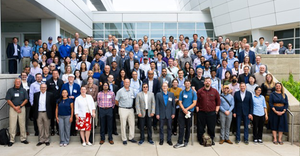recycling: Rocky Mountain Recycling Highs
December 1, 1998
Amy Smith
What does it take for a recycling program to rock in the Mountain states? Thanks to a new report "Recycling in Colorado: What it Takes to be Successful," the people in that state now have a better idea of the elements that have helped maintain or hinder their recycling efforts.
To assist budding recycling programs, the Colorado Governor's Office of Energy Conservation (OEC), Denver, funded two studies in 1997, which were conducted by Volkin and Associates, Boulder, Colo.
In March 1997, OEC recycling program managers chose the OEC grant recipient that would be studied. Phase I evaluated six successful programs at a cost of $3,335. Phase II, which cost approximately $5,000 to conduct, studied six recycling programs that have faced challenges. The results of both phases, which were completed by December 1997, are published in the "Recycling in Colorado" report.
Based on interviews with state and local government recycling program managers and on-site evaluations, Volkin found that a combination of elements can affect a program's success or failure. For example:
Support from political boards, city and county managers and the community is important for a recycling program to run smoothly and be sustainable, Volkin found. Political boards and top managers, such as executive budget committees, public works directors, city managers and city councils, typically respond to recycling program changes or provide money or other resources. However, without community support, there would be little participation and ultimately, political boards would not be supportive either.
For example, some of the programs had inconsistent and unreliable community support, possibly because residents do not consider recycling to be a top priority. A lack of financial support, the priority that a county gives to recycling or a commitment to recycling sustainability, could not only lead to program failure but also could prevent a program from starting.
Leadership and a program vision may come from citizens who support recycling or from government representatives who want to see changes in their communities. Without vision, recycling programs may never be formed, and without leadership, they may never be sustained.
Leadership can be a challenge when the skills necessary to operate a successful program is lacking, Volkin reports. For example, when many of the programs first were implemented, they had supportive environmental leaders, but most were volunteers who did not have sufficient experience in coordinating a recycling program.
Leadership skills include economic planning, strategic planning and goal setting, communications and education/outreach efforts.
Partnerships formed with other organizations or departments can be critical for a program's success. For example, some city-operated recycling programs rely on other city departments. Others receive cooperation from volunteers, businesses and local governments.
Convenience for users and reliable, city-owned equipment helps maintain high recycling participation rates and increase efficiency. All the programs evaluated had well-maintained drop-off centers that were almost always open. Several communities provided curbside collection, which made recycling even more convenient for residents.
For example, in addition to its curbside recycling program, the city of Loveland operates a yardwaste recycling center where residents can drop off materials.
Owning reliable equipment also is necessary to keep any program active because without the proper equipment, a program cannot expand nor provide basic recycling services.
Other factors that contribute to a recycling program's success include:
* educational and public relations outreach;
* a demonstrated ability to adapt and creatively solve problems;
* a paid program manager and labor force;
* obtainable goals;
* a recycling budget; and
* efficiency operations
Additional hurdles for programs to overcome are poor management, unqualified labor and labor shortages, all of which have hindered the growth and sustainability of some recycling programs.
While the communities that were evaluated in the two studies are diverse, and thus face strengths and weaknesses that are unique to their individual recycling programs, most had a combination of challenges and achievements that can be applied to any recycling program. Some communities are more isolated than others, and may not have access to recycling facilities or end markets. Others may have supportive communities that contribute funding and participation.
The successful programs overcame their obstacles: They gained the support of those involved, especially the community, adapted to new circumstances - changes in operations, staff, funding, equipment, etc. - and creatively solved their problems.
For more information or for a copy of "Recycling in Colorado: What it Takes to be Successful," contact 1675 Broadway, Ste. 1300, Denver, Colo. 80202-4613. Phone: (303) 620-4292 or toll-free (800) 632-6662. Fax: (303) 620-4288. Website: www.state.co.us/ gov_dir/oec
Contracts The Rockland Waste Management Authority, Hillburn, N.Y., has awarded Miele Sanitation, Closter, N.J., a five-year contract for collection, transportation and disposal services of the village of Haverstraw, N.Y.
International Rubbish Service, Riverside, Calif., has been awarded exclusive collection contracts in two Riverside County areas.
Pacific Western Technologies Ltd., Albuquerque, N.M., has announced a multi-year contract to provide technical and management services to the Department of Energy facilities at Albuquerque, Los Alamos, N.M., and Amarillo, Texas.
Waste Management Inc., Houston, has awarded multiple contracts to RRT Design & Construction, Melville, N.Y., for design/build services at the Chicago Sort Centers.
Toledo, Ohio-based N-Viro International Corp.'s Israeli licensee, Nesher Environmental Ltd., has executed its first contract for an N-Viro Soil facility near Bet-Shemesh, Israel.
You May Also Like


